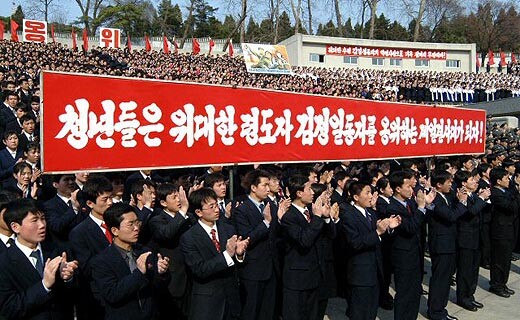hankyoreh
Links to other country sites 다른 나라 사이트 링크
Human Rights Commission holds forum on N. Korean human rights

The National Human Rights Commission of Korea on April 16 held its first forum on North Korea’s human rights situation since the inauguration of the new administration. In January, the NHRCK chose the North Korean human rights issue as one of six key projects it plans to carry out this year and decided that it would launch a major investigation, which will include an examination of the human rights situation faced by North Korean residents since 2000.
At the forum, Professor Hong Min of Dongguk University presented a paper on the North’s human rights situation, in which he said that North Korea has maintained the social order through a “reign of terror” by severely restricting the human rights of its residents since the mid-1990s, when the nation experienced its worst period of economic difficulty. Based on data obtained in the process of interviewing North Korean defectors, Hong pointed out that North Korea has executed even minor criminals without clear legal standards. He said that public education in the North has existed in name only for the past 10 years. The professor also reported that, in many cases, children are forced to sell sex.
There were, however, concerns about the reliability of the information provided by North Korean defectors and the potential for the issue to be manipulated political interests. Jeong Seong-jang, a researcher at the Sejong Institute, said, “It is true that North Korean defectors are important sources of information through which we can grasp the reality of North Korea’s human rights violations, but it is highly possible that they could give information about things that they did not directly experience.”
Yun Yeo-sang, the director of the Database Center for North Korean Human Rights, said, “The investigation into North Korea’s human rights situation is itself highly political and we should approach the issue with as much neutrality as possible to minimize conflicts.”
In the meantime, the commission is studying a set of specific plans for conducting extensive on-site investigations into human rights issues involving some 10,000 North Korean defectors in South Korea and other North Koreans who escape through neighboring China and are still there. In a committee meeting on April 13, the commission had originally planned to confirm these plans, but was unable to do so, citing some differences among committee members and saying that more time is needed for sufficient discussions. An official at the National Human Rights Commission said, “The plan for on-site investigations was aimed at correctly verifying human rights issues in North Korea, so there is no political motive.”
Some progressive activists have called on the commission to deal cautiously with the North Korean human rights issue. Park Seok-jin, an activist with the Sarangbang Group for Human Rights, said, “I don’t oppose the commission’s investigations into the North Korean human rights issue. However, the issue should not be exploited politically by conservative groups or be based on the (South Korean) government’s needs.”
Some civic groups, including the Sarangbang Group for Human Rights, the Catholic Human Rights Committee, and the Dasan Human Rights Center, have formed a joint monitoring team on North Korea’s human rights situation and publish a bimonthly newsletter, titled “Korean Peninsula Human Rights Newsletter” (Hanbando Ingwon).
Please direct questions or comments to [englishhani@hani.co.kr]
Editorial・opinion
![[Column] Park Geun-hye déjà vu in Yoon Suk-yeol [Column] Park Geun-hye déjà vu in Yoon Suk-yeol](https://flexible.img.hani.co.kr/flexible/normal/500/300/imgdb/original/2024/0424/651713945113788.jpg) [Column] Park Geun-hye déjà vu in Yoon Suk-yeol
[Column] Park Geun-hye déjà vu in Yoon Suk-yeol![[Editorial] New weight of N. Korea’s nuclear threats makes dialogue all the more urgent [Editorial] New weight of N. Korea’s nuclear threats makes dialogue all the more urgent](https://flexible.img.hani.co.kr/flexible/normal/500/300/imgdb/original/2024/0424/7317139454662664.jpg) [Editorial] New weight of N. Korea’s nuclear threats makes dialogue all the more urgent
[Editorial] New weight of N. Korea’s nuclear threats makes dialogue all the more urgent- [Guest essay] The real reason Korea’s new right wants to dub Rhee a founding father
- [Column] ‘Choson’: Is it time we start referring to N. Korea in its own terms?
- [Editorial] Japan’s rewriting of history with Korea has gone too far
- [Column] The president’s questionable capacity for dialogue
- [Column] Are chaebol firms just pizza pies for families to divvy up as they please?
- [Column] Has Korea, too, crossed the Rubicon on China?
- [Correspondent’s column] In Japan’s alliance with US, echoes of its past alliances with UK
- [Editorial] Does Yoon think the Korean public is wrong?
Most viewed articles
- 1‘We must say no’: Seoul defense chief on Korean, USFK involvement in hypothetical Taiwan crisis
- 2N. Korean delegation’s trip to Iran shows how Pyongyang is leveraging ties with Moscow
- 3‘Weddingflation’ breaks the bank for Korean couples-to-be
- 4Will NewJeans end up collateral damage in internal feud at K-pop juggernaut Hybe?
- 546% of cases of violence against women in Korea perpetrated by intimate partner, study finds
- 6[Column] Park Geun-hye déjà vu in Yoon Suk-yeol
- 7“Parental care contracts” increasingly common in South Korea
- 8[Column] Yoon’s first 100 days should open our eyes to pitfalls of presidential system
- 9[Interview] Dear Korean men, It’s OK to admit you’re not always strong
- 10[Editorial] New weight of N. Korea’s nuclear threats makes dialogue all the more urgent